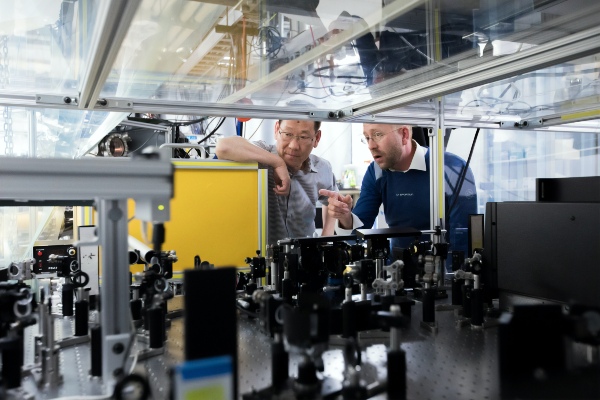From an outside perspective, engineering can seem like a pretty unexciting career path. But when you look at all of the job options available, all of the industries that engineers can work in, and the constant innovation happening across the world in engineering, you’ll see that engineering career pathways have a lot to offer.
Whether you’re just beginning your career search, or you’re thinking about changing jobs, you’ll likely be wondering “Is engineering a good job?”. In this article, we share some of the key reasons why engineering is a good career, along with popular engineering fields and the best pathways to ensure career success.
Why Choose Engineering as a Career?
Here are just some of the reasons why to choose engineering as a career.
Resilience
Job security is something that many people worry about, but as an engineer, you can feel confident that your industry is resilient. Unlike IT, which has its highs and lows that can make working in this sector quite unpredictable, engineering will always be required to keep society functioning as normal, whether that’s manufacturing vehicles, harnessing and distributing energy, developing medicine or facilitating construction.
Whilst certain sectors of engineering are predicted to grow or shrink, the skills you have as an engineer are adaptable. There are always new developments happening and innovative thinking driving progress forward, so no matter the climate, engineering is an industry that will survive and develop.
Versatility
Engineering careers can range from jobs working on a computer all day to jobs building machinery with your hands. You don’t have to be a certain kind of candidate to succeed as an engineer; there are so many different roles that require different skills and personality types.
Engineers can work in a wide range of industries in all kinds of workplaces, as part of a team or independently. The versatility of engineering career progression means that it’s also not too difficult to specialise in multiple areas throughout your career, as long as you have the right experience and qualifications.
Practical
As more and more jobs are becoming automated or digital, a big reason to choose engineering as a career is that it remains a very practical role. There are jobs like designer or developer that still require a lot of work on a computer, but plenty of engineering jobs offer hands-on opportunities to build, test, refine and fix components or equipment.
A career in engineering can also be incredibly satisfying because of its practical nature. No matter your sector, you’ll usually be working to find solutions to a problem and complete projects that have a particular purpose or goal, which makes the work very rewarding and engaging.

Learning
Leading on from that point, another reason why engineering is a good career is that it offers the chance to continue learning throughout your time as an engineer. There are always new qualifications that can be gained, new theories to learn about and new skills to develop that will support and enhance your career progression, especially as engineering is a constantly evolving discipline.
This is a big advantage for candidates who don’t like to feel stagnant and always want opportunities to develop and try new things. If you’re looking for a career that can constantly challenge and push you to grow, engineering is the right choice!
Global
Engineering is a global discipline, with employers stationed all over the world. If you like the idea of a career that can take you anywhere then engineering is a great choice because it offers the possibility of moving to new countries for your work. New developments can happen anywhere, and as an engineer your role can take you across the globe in order to work on projects, gain new skills and support emerging initiatives.
Compensation
Engineering is a rewarding career path, but another advantage is that it can also be very profitable. Even junior and graduate engineering roles are well compensated, with average salaries usually above what other candidates receive for similar-level roles in other industries.
The earning potential for senior engineer jobs is also very competitive, especially for candidates looking to work as consultants or specialists. Certain engineering sectors also have particularly lucrative salaries, so if you’re motivated by the prospect of high earnings, areas like aerospace, petroleum, computing and mechanical engineering roles promise excellent pay.
What Career Fields Are Available in Engineering?
Engineering is an incredibly diverse career pathway, with plenty of different areas that you can go into, as well as roles that span multiple industries. Below, we take a look at some of the most popular fields of engineering that candidates work in.
Software Engineering
Software engineering is a type of computer science that involves using engineering design processes to develop software. It’s used to develop programs, applications and computer systems and is needed across a wide range of industries.
A software engineer will need excellent programming skills as well as knowledge of engineering theory and different computer systems. It’s a role that often involves a lot of independent work, but candidates will also need to be able to collaborate on software projects. Coding skills are necessary, but you’ll also need to be confident in debugging software and writing up technical documentation.
Electronic Engineering
Electronic engineering centres around electronic components, devices, equipment and systems. It’s quite a practical field of engineering that is used across a range of sectors, including automation and control, telecommunication, defence, medical and robotics.
An electronic engineer will spend a lot of their time designing or helping to build electronic components and devices, as well as helping to refine existing products and integrate them into larger systems or machinery. Most electronics engineers work as part of a team with other engineers from different disciplines, doing a mixture of practical and programming or CAD work.

Mechanical Design Engineering
Mechanical design engineering involves designing all kinds of mechanical components, parts, systems and products. It’s a specialist mechanical engineering role that focuses on the design and manufacturing process in the early stages of a mechanical project, involving creating new mechanical items that align with specifications and standards.
As a mechanical design engineer, you’ll have excellent design skills and a comprehensive knowledge of mechanical engineering theory and design principles. You’ll often be responsible for initial ideas and technical mock-ups during a project, and once a design has been approved, you’ll usually hand the work over to other engineers.
Automotive Engineering
Automotive engineering involves designing, developing, manufacturing and refining automotive vehicles. It draws on mechanical and electrical engineering concepts and applies this theory to automotive vehicles, finding safe and efficient ways to create reliable modes of transport.
Automotive engineers will often work for car, bus, motorbike or bus companies, either working on the design and production of these vehicles or the systems that power them. It’s another relatively practical field of engineering that requires candidates to be on-site and working collaboratively, unless they’re designing systems or components using CAD software.

Chemical Engineering
Chemical engineering is a popular field of engineering that concerns the development processes that will transform raw materials into finished products. Sectors that use chemical engineering include medicine, energy, food and manufacturing, where engineers work to find the most efficient, safe and sustainable ways to develop materials into useful items.
A chemical engineer often needs to specialise to work in a particular sector, as you’ll need particular knowledge of certain materials in order to design and develop processes which transform them. Chemical engineers rely on engineering, chemistry, biology and mathematical knowledge to do their roles, so it’s a practical field that also needs a lot of theoretical understanding.
Biomedical Engineering
Biomedical engineering is the combination of engineering and biology, looking at how engineering concepts can be applied to biological functions. The healthcare industry primarily benefits from work in this field, with everything from medical devices to new treatments being developed.
If you have an interest in biology or healthcare but want a role with the mathematical backbone of engineering, this is a great field to work in. Biomedical engineers often work in labs as part of a team and will be involved in developing new products or treatments, running tests and making improvements, and designing processes to implement the new things they have created.
Engineering Career Paths
Now that we’ve highlighted some of the most popular career fields to work in, what does engineering career progression look like and what kind of path do you have to take to become an engineer?
Education
Engineering is an industry that requires a lot of knowledge and innovation, which means that there are academic requirements for those who want to work in the area. The majority of engineers study the discipline at university, and this requires getting top grades in subjects like Maths, Computer Science, Physics, Chemistry and Biology at A Level. Some degrees also require top grades in Maths and English at GCSE as well.
There is a wide range of different engineering degrees available across institutions around the world. When applying for courses, you will need a rough idea of the type of engineering you’d like to go into as this will dictate the type of engineering you study.
Here are some of the most common engineering degrees:
- Aerospace engineering
- Chemical engineering
- Civil engineering
- Control systems engineering
- Electrical and electronic engineering
- General engineering
- Mechanical engineering
- Robotics engineering
- Software engineering

Students who have studied Physics, IT, Computer Science and Mathematics can also go into engineering jobs after university, depending on the role they apply for and the practical modules that they study.
It’s also possible to complete an engineering apprenticeship, which takes longer but gives you the same training you need to work in the engineering industry, often with more practical work experience.
A lot of engineering degrees are four years long and include an integrated Masters, which isn’t a requirement for an engineering job but many companies prefer. Some engineering students also choose to complete a year in industry during their degree, which helps them to narrow down the sector or role that they want to work in and can improve their chances of employment when they graduate.
Engineering Career Progression
Once you’ve completed a degree or equivalent qualification, most engineers will begin their careers working in junior roles. They may move companies and industries whilst figuring out the kind of work they enjoy the most, gaining experience and potentially more qualifications during this.
There are generally two paths your career in engineering might take as you progress; becoming a manager or specialising in a particular area. Over time you might do both of these, but a lot of engineering candidates realise early on whether they want to manage people in a senior position or work on a particular type of project as an experienced engineer or even a consultant.
Different engineering roles will have different pathways, but the general trend after studying engineering is that you’ll gain more experience and responsibility as your career progresses. Getting work experience will help you decide the field of engineering you want to work in, or the kind of company you want to work for, and then most engineers will tailor their training and job search to this.

Summary
A career in engineering is an excellent choice if you’re looking for opportunities with plenty of variety, regular development opportunities, and widespread applications. Not only is the financial compensation better than a lot of other industries, but engineering companies can be at the forefront of innovation and discovery, offering candidates the chance to make a tangible contribution or difference to the world.
Some of the best engineering fields for the future include embedded systems engineering and embedded software development, which are used in IoT technology and all kinds of devices that we use every day. If you’re thinking about a career in engineering, embedded systems is a great area to work in, and KO2 is a specialist recruitment agency that can help you find your ideal role in this industry. Take a look at our available jobs, read more of our career advice, or get in touch to speak to the team.







